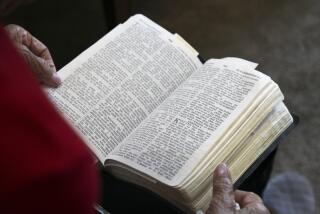Getting in Touch With the Bible’s Inclusive Self : Religion: In ‘New Testament and Psalms,’ Christ is a ‘child,’ not a ‘son.’ Women should commit, not submit, to husbands. But not everyone is happy with the shift to ‘90s political correctness.
- Share via
In the Gospel of Matthew, Jesus tells his followers, “This is how you should pray.” Then he teaches them the words all disciples have come to know by heart: “Our father who art in heaven. . . .”
In the Gospel of Matthew, according to the six editors of the “New Testament and Psalms: An Inclusive Version,” (Oxford University Press), Jesus goes ‘90s and begins, “Our father-mother in heaven. . . .”
Critics are calling the book laughable. Yet it is already in its second printing after less than a month in stores.
“It’s for customers looking for an alternative to traditional Bibles,” says Ann Rucker, publicity manager for Barnes and Noble. Hers was one of several major chain stores to place orders of 1,000 or more copies.
The Westwood branch of Barnes and Noble stocked 15 of the books to start. That is considered a large number for a Bible. But it pales in comparison to the 300 copies ordered by the Graduate Theological Union bookstore in Berkeley.
“The first 50 sold in one day,” says manager Debra Farrington. The store services nine seminaries as well as a sizable online clientele around the world.
The editors of the new translation are an interdenominational group of scholars: Burton Throckmorton, Susan Thistlethwaite, Sharon Ringe, Victor Gold, Thomas Hoyt Jr. and Barbara Withers, all known for their liberal bent.
Their goal was to remove every Scripture-based excuse for injustice against the underprivileged and minorities. Male and female, employer and employee, Christian and non-Christian are all equal in their glossary of terms.
Christ is now a “child” not a “son.” Slaves are the “enslaved.” Women are instructed to commit, not submit to their husbands. Jews are “authorities,” to avoid anti-Semitism. And the “King” of heaven is referred to as “ruler”--after all, who’s to say she’s not a woman?
“I’m not sure I’d call it a shift in theology,” says Throckmorton, a Presbyterian minister on the faculty of Bangor Theological Seminary in Maine. “It is our language that is shifting. God is not literally a father, any more than God is a rock or a lamb,” he says, referring to other biblical terms for divinity. “Any statement we make about God has to be a metaphor.”
Social realism played a part in shaping this new translation. “In modern culture, the mother is not subsumed under the father, as she was in the culture of the Gospels,” Throckmorton says. “In that world, females, children, slaves and cattle were all property. Now, in some households there is no father. There is only a mother.”
He compares this rewrite to the language overhaul recently adopted by the news media, where firefighter replaces fireman and police officer replaces policeman.
But critics don’t buy it.
“These editors are imposing their own ideology on Scripture,” complains Elizabeth Achtemeier, a Bible scholar on the faculty of Union Theological Seminary in Richmond, Va. “They’re giving in to culture. This isn’t the way to update tradition.”
Achtemeier argues that the bedrock of the faith is passed on through the Bible. “Mess with that and you end up in a place where God becomes identical with all the world. So that I am divine, and you are. That’s not biblical.”
She agrees that ancient Scripture does present problems. “No doubt the church has not been faithful to the Gospel message,” she says. “It has put down women since AD 2. But, study Scripture and you can see the error of that.
“Jesus breaks all the stereotypes. He talks to a Samaritan woman in the street, though society said he wasn’t supposed to. He teaches Mary and Martha at home, though society said he wasn’t supposed to.”
Radical feminists will use the New Testament inclusive language translation for formal worship services, Achtemeier predicts. But, she says, “most scholars will laugh at it.”
David Scholer, a New Testament scholar at Fuller Theological Seminary in Pasadena, considers himself a feminist. Yet, he says, “I’m not in favor of changing the ancient text. I don’t want anyone to rewrite the Constitution either. That totally removes the possibility of understanding it in its historical context.
“Like it or not,” Scholer says, “if the Bible is to remain a historical document, changing the language is cheating. . . .
“I denounce using a literal translation of the Bible to justify oppression of Jews and women, but don’t alter the original document to correct that mistake,” he argues.
“If the point is to reach people who read the Bible, re-educate them in the churches, with adult education classes. Plan long-range programs to reverse the negative trends in the history of the church.”
*
The task of bringing Scripture into the modern world was boldly attempted in 1989, with publication of the National Council of Churches’ “New Revised Standard Version of the Bible.” It adapted non-specific gender language, except when referring to God.
Throckmorton and his team used the NRSV as their basic text. But they went further.
“If you believe the language you use to describe God, and God is only spoken of as a superior white male, then you will believe that females or children aren’t equal to males,” Throckmorton explains.
“The church has never been a leader in these things,” he says of modern usage translations. “But, it is imperative that the church speak to everyone on an equal basis.”
Throckmorton, 74, became involved in the issue of inclusive language about 20 years ago, when he wrote a letter to the National Council of Churches. “I asked them what they were going to do about the constant reference to men only in the Bible,” he recalls.
The council invited him to work on an inclusive lectionary, or prayer book, which was published in 1983. Many mainline Christian denominations now use it.
He doesn’t suppose the inclusive New Testament is for everyone. “We never considered conservatives to be among our audience,” he says.
He sees the book as a study Bible, useful in comparing various translations. He expects some people to read it and meditate upon it in private prayer. He also knows of ministers who will read it aloud in church. His son, Hamilton, ordained in the United Church of Christ, already does.
“Every translation is subjective,” Throckmorton says. “This one is another voice.”
More to Read
Sign up for Essential California
The most important California stories and recommendations in your inbox every morning.
You may occasionally receive promotional content from the Los Angeles Times.













